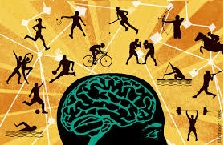|
Kategorie
|
-
-
-
 Psychologon / Psychologon
Autogenní trénink – stále aktuálnější tradice (nejen) při zvládání stresu
Autogenní trénink (tzv. autogen) je celosvětově vysoce ceněnou relaxační metodou. Svou jednoduchostí a principiálním zaměřením je v dnešní stresem prosycené době velmi výtěžným postupem. Tradiční pojetí v aktuálním „kabátě“ může být cennou součástí „antistresové výbavy“ každého z nás... Psychologon / Psychologon
Autogenní trénink – stále aktuálnější tradice (nejen) při zvládání stresu
Autogenní trénink (tzv. autogen) je celosvětově vysoce ceněnou relaxační metodou. Svou jednoduchostí a principiálním zaměřením je v dnešní stresem prosycené době velmi výtěžným postupem. Tradiční pojetí v aktuálním „kabátě“ může být cennou součástí „antistresové výbavy“ každého z nás...
Pavel Humpolíček / 1. 9. 2021
-
-
-
 Psychologon / Psychologon
Autogenic training – current tradition (not only) in stress management
Autogenic training (or autogen) is a worldwide highly-appreciated relaxing method. Its simplicity and basic field of focus makes it very often used procedure in these stressful times. The traditional concept in a modern way may be an important element of our “anti-stress equipment”. Psychologon / Psychologon
Autogenic training – current tradition (not only) in stress management
Autogenic training (or autogen) is a worldwide highly-appreciated relaxing method. Its simplicity and basic field of focus makes it very often used procedure in these stressful times. The traditional concept in a modern way may be an important element of our “anti-stress equipment”.
Pavel Humpolíček / 1. 9. 2021
-
-
-
 Psychologon / Rešerše
Study suggests humor could be an emotion regulation strategy for depression
"“As such, it appears that humor could broaden depressed individuals’ repertoire of adaptive tools of dealing with potentially depressogenic experiences, and in the long run, enhance their resilience. The study also demonstrated that creating humor in the face of adversity is difficult and requires from vulnerable individuals substantial effortful, which may potentially lead to their reluctance and lack of success in applying this strategy,” Braniecka said." Psychologon / Rešerše
Study suggests humor could be an emotion regulation strategy for depression
"“As such, it appears that humor could broaden depressed individuals’ repertoire of adaptive tools of dealing with potentially depressogenic experiences, and in the long run, enhance their resilience. The study also demonstrated that creating humor in the face of adversity is difficult and requires from vulnerable individuals substantial effortful, which may potentially lead to their reluctance and lack of success in applying this strategy,” Braniecka said."
PsyPost / 11. 3. 2019
-
-
-
 Psychologon / Psychologon
Autogenic training – current tradition (not only) in stress management (re-published)
Autogenic training is a worldwide highly-appreciated relaxing method. Its simplicity and basic field of focus makes it very often used procedure in these stressful times. The traditional concept in a modern way may be an important element of our “anti-stress equipment”. Článek je k dispozici také v češtině - odkaz je uveden v úvodu a závěru anglické verze. Psychologon / Psychologon
Autogenic training – current tradition (not only) in stress management (re-published)
Autogenic training is a worldwide highly-appreciated relaxing method. Its simplicity and basic field of focus makes it very often used procedure in these stressful times. The traditional concept in a modern way may be an important element of our “anti-stress equipment”. Článek je k dispozici také v češtině - odkaz je uveden v úvodu a závěru anglické verze.
Pavel Humpolíček / 18. 3. 2018
-
-
-
 Psychologon / Rešerše
Judson Brewer: A simple way to break a bad habit
Can we break bad habits by being more curious about them? Psychiatrist Judson Brewer studies the relationship between mindfulness and addiction — from smoking to overeating to all those other things we do even though we know they're bad for us. Learn more about the mechanism of habit development and discover a simple but profound tactic that might help you beat your next urge to smoke, snack or check a text while driving. Psychologon / Rešerše
Judson Brewer: A simple way to break a bad habit
Can we break bad habits by being more curious about them? Psychiatrist Judson Brewer studies the relationship between mindfulness and addiction — from smoking to overeating to all those other things we do even though we know they're bad for us. Learn more about the mechanism of habit development and discover a simple but profound tactic that might help you beat your next urge to smoke, snack or check a text while driving.
www.ted.com / 11. 2. 2016
-
-
-
 Psychologon / Rešerše
Robert Waldinger: What makes a good life? Lessons from the longest study on happiness
What keeps us happy and healthy as we go through life? If you think it's fame and money, you're not alone – but, according to psychiatrist Robert Waldinger, you're mistaken. As the director of a 75-year-old study on adult development, Waldinger has unprecedented access to data on true happiness and satisfaction. In this talk, he shares three important lessons learned from the study as well as some practical, old-as-the-hills wisdom on how to build a fulfilling, long life. Psychologon / Rešerše
Robert Waldinger: What makes a good life? Lessons from the longest study on happiness
What keeps us happy and healthy as we go through life? If you think it's fame and money, you're not alone – but, according to psychiatrist Robert Waldinger, you're mistaken. As the director of a 75-year-old study on adult development, Waldinger has unprecedented access to data on true happiness and satisfaction. In this talk, he shares three important lessons learned from the study as well as some practical, old-as-the-hills wisdom on how to build a fulfilling, long life.
www.ted.com / 27. 12. 2015
-
-
-
 Psychologon / Rešerše
Chieko Asakawa: How new technology helps blind people explore the world
How can technology help improve our quality of life? How can we navigate the world without using the sense of vision? Inventor and IBM Fellow Chieko Asakawa, who's been blind since the age of fourteen, is working on answering these questions. In a charming demo, she shows off some new technology that's helping blind people explore the world ever more independently ... because, she suggests, when we design for greater accessibility, everyone benefits. Psychologon / Rešerše
Chieko Asakawa: How new technology helps blind people explore the world
How can technology help improve our quality of life? How can we navigate the world without using the sense of vision? Inventor and IBM Fellow Chieko Asakawa, who's been blind since the age of fourteen, is working on answering these questions. In a charming demo, she shows off some new technology that's helping blind people explore the world ever more independently ... because, she suggests, when we design for greater accessibility, everyone benefits.
www.ted.com / 6. 12. 2015
-
-
-
 Psychologon / Psychologon
Mental Time Travel and the Role of Memory in Planning the Future
A well-known witticism says that many people complain about bad memory, but only few about a bad brain. Some people justify this memory deficit by their apparent excess of imagination and by the presence of a vision for the future. That is because the ability to plan for the future and imagine one’s own development trail is a necessity and a prerequisite for success in today’s world. Is this justification valid also for memories of the future, as some researchers call the images of the future? Many studies suggest that memory, specifically the autobiographical memory, is very important for one’s successful planning of future actions. Mental time travel to the future, but also how to keep one’s resolutions for the future better (for example, how to lose weight more easily) are the topics of this article. Psychologon / Psychologon
Mental Time Travel and the Role of Memory in Planning the Future
A well-known witticism says that many people complain about bad memory, but only few about a bad brain. Some people justify this memory deficit by their apparent excess of imagination and by the presence of a vision for the future. That is because the ability to plan for the future and imagine one’s own development trail is a necessity and a prerequisite for success in today’s world. Is this justification valid also for memories of the future, as some researchers call the images of the future? Many studies suggest that memory, specifically the autobiographical memory, is very important for one’s successful planning of future actions. Mental time travel to the future, but also how to keep one’s resolutions for the future better (for example, how to lose weight more easily) are the topics of this article.
Vojtěch Juřík / 5. 8. 2015
-
-
-
 Psychologon / Psychologon
Pomáha hudba pri učení?
Nielen študenti si často kladú otázku, ako sa dá zefektívniť učenie a kognitívne procesy, prostredníctvom ktorých učenie prebieha, a to najmä pozornosť, pamäť, motivácia. Mnohí z nich si za týmto účelom zapínajú svoju obľúbenú hudbu počas prípravy do školy, počas učenia sa a písania domácich úloh. Cieľom tohto článku je preskúmať, či sa dá učenie a následné zapamätávanie naučeného ovplyvniť, a či sa dá predpokladať, že práve hudba prehrávaná v pozadí pôsobí pozitívne alebo naopak, vplýva rušivo a výkon znižuje. Psychologon / Psychologon
Pomáha hudba pri učení?
Nielen študenti si často kladú otázku, ako sa dá zefektívniť učenie a kognitívne procesy, prostredníctvom ktorých učenie prebieha, a to najmä pozornosť, pamäť, motivácia. Mnohí z nich si za týmto účelom zapínajú svoju obľúbenú hudbu počas prípravy do školy, počas učenia sa a písania domácich úloh. Cieľom tohto článku je preskúmať, či sa dá učenie a následné zapamätávanie naučeného ovplyvniť, a či sa dá predpokladať, že práve hudba prehrávaná v pozadí pôsobí pozitívne alebo naopak, vplýva rušivo a výkon znižuje.
Michaela Mosnáčková / 13. 6. 2015
-
-
-
 Psychologon / Psychologon
Role psychologa v přípravě vrcholového sportovce
Článek se stručně a přehledově zaměřuje na specifika a specifické role psychologa v přípravě vrcholového sportovce, zejm. v individuálních sportech či sportech s prvky individuální přípravy. O psychologii sportu již bylo sepsáno množství monografií (např. doc. Blahutková). Článek proto vychází spíše z osobní zkušenosti a pokouší se ponoukat k širším souvislostem a pohledům... Psychologon / Psychologon
Role psychologa v přípravě vrcholového sportovce
Článek se stručně a přehledově zaměřuje na specifika a specifické role psychologa v přípravě vrcholového sportovce, zejm. v individuálních sportech či sportech s prvky individuální přípravy. O psychologii sportu již bylo sepsáno množství monografií (např. doc. Blahutková). Článek proto vychází spíše z osobní zkušenosti a pokouší se ponoukat k širším souvislostem a pohledům...
Pavel Humpolíček / 4. 3. 2015
-
-
-
 Psychologon / Psychologon
Iluze transparentnosti a Spotlight efekt: Proč se často stresujeme zbytečně?
Lidé přeceňují schopnost ostatních rozpoznat jejich vlastní pocity. Tenhle fenomén se nazývá iluze transparentnosti. Lidé ale přeceňují i zájem ostatních o jejich vlastní chování. Tento fenomén se nazývá spotlight efekt. Společně oba efekty omezují člověku život a zbytečně ho stresují. Navíc bylo prokázáno, že vědomost těchto efektů napomáhá ke zbavení se stresu a objektivně zlepšuje výkon. Psychologon / Psychologon
Iluze transparentnosti a Spotlight efekt: Proč se často stresujeme zbytečně?
Lidé přeceňují schopnost ostatních rozpoznat jejich vlastní pocity. Tenhle fenomén se nazývá iluze transparentnosti. Lidé ale přeceňují i zájem ostatních o jejich vlastní chování. Tento fenomén se nazývá spotlight efekt. Společně oba efekty omezují člověku život a zbytečně ho stresují. Navíc bylo prokázáno, že vědomost těchto efektů napomáhá ke zbavení se stresu a objektivně zlepšuje výkon.
David Lacko / 1. 3. 2015
-
-
-
 Psychologon / Uncategorised
The psychology of evil (and hero)
... how easy it is to be a hero, and how we can rise to the challenge aneb ´jak jednoduché je být hrdinou´ a nepodlehnout moci a zlu. Psychologon / Uncategorised
The psychology of evil (and hero)
... how easy it is to be a hero, and how we can rise to the challenge aneb ´jak jednoduché je být hrdinou´ a nepodlehnout moci a zlu.
www.ted.com / 23. 2. 2015
|
|